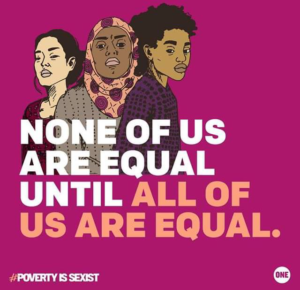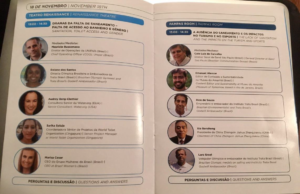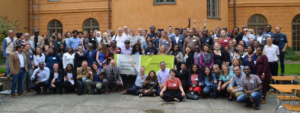1. Corporate culture

When at a conference, we try to count the number of women and men at the audience. Not surprisingly, women are often in a numeric balance, if not in advantage. Nevertheless, this advantage cannot be extrapolated when it comes to the question: who has the voice? The “Gender Diversity & Inclusion in Events Report” found that, globally, more than two thirds of speakers are male.1 In case this does not reflect your personal experience, we invite you to browse through: https://allmalepanels.tumblr.com/.
Women, in particular black women, women of color and trans* persons are in the blind spot, which has several and long lasting effects in the lives of these professionals. It not only leads to a representative crisis, but to gender inequalities in career lives. In many sectors, women prepare the schedules and presentations that their often-male bosses will be holding. In many sectors, women have been occupying auxiliary and implementing roles, but seem to have less to say when it comes to public fora. This in its turn, relegates women to a less-visible position, in each the audience is led to believe that women have limited to none contribution to the presented or that their perspectives are not relevant. We know that, it is not the reality on the ground.
It is practically impossible to think of a topic in our society, in which women would not be able to make a meaningful contribution. Hence, it should be unacceptable to organize, promote, participate and attend the so-called all-male panels, or manels, in the informal language.
Seeing more women, black women, women of color and trans* persons in the forefront and in the spotlight, dealing with all subjects is inspiring and encouraging for young professionals, students and children. We hope that by providing good examples of diversity, we will initiate a virtuous circle.
Gender diversity is improving – but way too slow! Despite many efforts and commitments, GIZ staff (men and women alike) still organize, promote and attend sessions and events that are mainly composed by men. The issue has several dimensions, some more structural, others more situational.
This is why we need more efforts. With this proposal, we would like to stimulate the reflection about our own practices and suggest small steps and commitments from GIZ staff that can start addressing the issue. The absence of women at public professional forums is a problem. But, we believe gender imbalance at events is entirely solvable and we recommend six measures, that GIZ can undertake:
1. As GIZ, commit to organize gender-balanced panels (not including the moderator), conference sessions, events, price awards, webinars, etc. and no all-male panels.2 Gradually start to address the issue with partners and consultants, inviting them to join the pledge.
2. Encourage GIZ employees to take the pledge for their work
3. Use pledge icons at events agendas, in event invitations, or personal signatures. For example:
When organising an event: GIZ Panel Pledge Advocate – This Event is committed to gender balance
On event brochures: GIZ Panel Pledge Champion – This event demonstrates gender balance
For individuals: GIZ Panel Pledge – I stand for gender diversity at every forum
4. Create an enabling and supportive structure that allows more women participation in professional events. For instance, by motivating female GIZ staff that they are competent enough to speak on a panel and strengthening their oratory capacity, offering mentorship and special capacity development offers that are tailor-made for women, with particular attention to the specific needs of black women, women of color and trans* persons.
5. Provide GIZ staff with answers to typical excuses, like
There aren’t enough qualified female speakers
It’s a male-dominated field
Women are shy
Women just aren’t interested in this field
Guys sell tickets
The organisers wanted the best speakers we could find
The women we called were booked
You can’t kick out a man just to fit a woman in there
We need “big name speakers” and few of those are women
The moderator is already a lady
6. Provide a checklist for conference and event organisers
These measures are clear steps towards implementing the Charta of Diversity that has been recently signed by GIZ. As Elizabeth Broderick, sex discrimination commissioner on the Australian Human Rights Commission, has said, “If you don’t intentionally include, the system unintentionally excludes.”3
2. Gender competence
We work in the sector programme sustainable sanitation, where the Sustainable Sanitation Alliance is anchored. Sanitation (not to mention the water sector) is commonly known as a male-dominated and over-engineered field. Despite having extremely qualified women in all levels, in many cases where overall gender balance is achieved in a conference, is due to sessions focusing on gender and soft aspects of project implementation, i.e. community participation, capacity building, or specifically in our sector, menstrual hygiene. This has lead us to reflect that the professional world imitates private life. In real life women are constantly assigned to caretaker professions (housewives, nurses, teachers, social workers) and carry the burden of domestic chores. In professional life, these predefined role-divisions are perpetuated. These panels are heavily composed by women, reproducing the false understanding that women are not qualified to discuss technical issues or social aspects are too irrelevant to be dealt by men.
In addition, in the sanitation sector, women are often seen as beneficiaries, not decision makers, while men are seen as (technical) experts.
Figure 1: Two simultaneous sessions at the World Toilet Summit 2019. Left: Sanitation, toilet access and gender, with 4 female panelists and a male panelist. Right: The lack of sanitation and the impacts on the tourism and sports, a typical manel.
Within our team, we hence decided to set a focus on the importance of giving women a voice and a stage by including them prominently into international conferences and events. In the secretariat of SuSanA we organise global network meetings and in this position we are the decisive authority on who is invited and who will finally present.
3. Cooperation
Our motto: commit yourself, set a good example, and others will follow.
Major challenges
● Searching for more “unknown” speakers takes more time. More time capacities are needed compared to going with the same-old speakers.
● Young female professionals that presented for the first time needed mentoring and guidance. More time capacities needed.
● There are more male persons in management levels, which represents a challenge especially when selecting e.g. opening remarks.
● Often, the final composition of the panel is only confirmed close to the event, making it difficult to ensure the gender balance.
● Decision on who from counterparts (ministries, utilities etc.) attends to regional and international events is often based on seniority and hierarchy, which may exclude female professionals in many contexts.
● Last minute cancellations of representatives from the Global South due to visa issues.
The key success factors
● Actively searching for female speakers in the first steps of organising the event, i.e. asking for recommendations and preparing lists of qualified female professionals
● Engaging men as co-responsible for the solution by asking for representation of a female person on their behalf
● Dedicate the required time throughout the whole process of organising events
● Monitor gender and diversity representation of speakers and guests regularly
● An increased awareness about the topic of inclusive representation at events and conferences within the GIZ team
● Use social media as means for outreach to identify and contact female professionals
● NEVER GIVE UP!
The outcome
In SuSanA it was decided together with the steering group in November 2019 that it is an internal rule:
We as SuSanA have a strong commitment towards gender, ethnic and sectoral representation and will strongly work towards diversity in SuSanA organized events. Over the past years, the secretariat has been paying increasing attention to gender balance and representation in the organization of events (SuSanA Meetings, webinars, conference sessions etc). As all male panels are not only a misrepresentation of the sector diversity, but also a disservice to gender equality struggles in all its dimensions, we will make gender diversity a precondition for SuSanA organized events.
This rule should be implemented not only by the secretariat based at GIZ, but by all regional structures, and in the long term also by all (currently 350) partner organisations and 11,000 individual members of the network. The 28th global network meeting in August 2019 was one of the biggest, and most diverse meetings we ever had!



